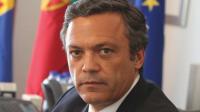Madeira vice-president eyes fiscal independence from Lisbon

Pedro Calado, vice-president of Madeira’s regional government, tells Sebastian Shehadi about the island's capacity for more upmarket tourism and its ongoing struggle to gain financial independence from Portugal.
Q: What kind of foreign investment are you looking for in the key sector of tourism in Madeira?
A: We have sea, mountains and so many outdoor activities. Our tourism industry is increasing in revenues, tourist numbers and available rooms. The sector creates about 25% of our GDP, and employs about 17% [of the workers] in Madeira.
We have 30,000 beds, which is not enough. We want quality tourism, not mass tourism, which is why we have lots of four- and five-star hotels. Our revenue per available room is about €56 per night, but four years ago it was about €48. We had about 3.3 million tourists arriving in 2018 by plane, which represents a 45% increase since 2007. By boat, we had 540,000 in 2018, up from 473,000 in 2013. Altogether, that’s 4 million tourists coming to our island of 254,000 civilians.
We also have great conditions for business tourism. We want more of that. The next European Bridge Championship will come to Madeira in 2020. We want more upmarket tourism such as this [as well as health tourism and ecotourism].
Our emerging sectors are in technology and software engineering. We need more investment in these sectors that can attract more young specialists here. We have good fiscal conditions for these companies, and [we offer a good] quality of life. Through tech, we can export our services around the world, [beyond our small borders]. We have an excellent telecommunications network, and we are preparing for 5G.
Q: Are you attempting to reform Madeira’s fiscal regime?
A: The International Business Centre of Madeira [IBCM], which contributes 15% to our GDP, gives its companies a 5% corporate tax rate, but we want to provide that tax rate across the whole of Madeira. For this, we need [Lisbon’s] approval, and we are trying very hard to implement that. I think all Madeirans want this change; we want to be financially independent from mainland Portugal. It’s necessary for [Lisbon] to compromise, and for the European Commission to change its view of the IBCM.
Q: What is wrong with the EU’s view of the IBCM?
A: There are lots of lobbies that operate in EU. You have Gibraltar, Cyprus, Malta and other international business centres that are competing with us. So if the lobbies put pressure on Madeira, companies leave Madeira to go to other countries. The image that the lobbies are constructing of Madeira, in the EU and elsewhere, is not a good one. We are not an offshore tax haven: the companies that come here are audited and inspected.
To benefit from the 5% tax rate in Madeira, the EU conditioned that investors must create a certain number of jobs on the island. [But this is misguided.] It is an international business centre... The European Commission doesn’t accept that some companies based here may have many workers outside of Madeira; therefore, those companies are not gaining the full fiscal benefits they deserve. We have explained this to the EU, and are trying to resolve this.
Q: What else distinguishes Madeira from similar places?
A: We have safety, a very good public infrastructure, a great quality of life, stable politics and fiscal stability. You can walk at night on the streets, at any time. Our second island, Porto Santo, has 5000 people and a 9-kilometre sandy beach. We want to make it the world’s first carbon emission-free island: 35% of all energy in Madeira is produced by renewable energy, and by 2020 it will be 50%. The renewable energy project we have in Porto Santo includes electric cars and eco-friendly homes.

Global greenfield investment trends
Crossborder investment monitor
|
|
fDi Markets is the only online database tracking crossborder greenfield investment covering all sectors and countries worldwide. It provides real-time monitoring of investment projects, capital investment and job creation with powerful tools to track and profile companies investing overseas.
Corporate location benchmarking tool
fDi Benchmark is the only online tool to benchmark the competitiveness of countries and cities in over 50 sectors. Its comprehensive location data series covers the main cost and quality competitiveness indicators for over 300 locations around the world.
Research report
fDi Intelligence provides customised reports and data research which deliver vital business intelligence to corporations, investment promotion agencies, economic development organisations, consulting firms and research institutions.
Find out more.




